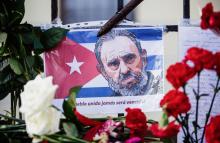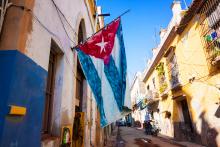Embargo

On my first trip to Cuba in 2022, I met Jorge González Nuñez, president of the Movimiento Estudiantil Cristiano de Cuba (MEC). I asked how he would describe the situation the Cuban people were living in, impacted by the U.S.’ decades-old trade embargo and other policies introduced by the administrations of former President Donald Trump and President Joe Biden, from a theological perspective. His answer stuck with me.
“The Cuban people are going through a crucifixion,” he said without hesitation. “It is hard to have hope.”
He paused and then added, “But there is resurrection.”

There was something changing — on my more recent visits, people have been publicly talking politics in ways they previously would have done only behind closed doors. Yet with U.S. President-elect Donald Trump now threatening to roll back Obama’s strides in U.S.-Cuba relations, it’s hard to say how many Americans will get to meet this Cuba.
U.S. law stipulates that the U.S. embargo cannot be lifted unless both Castros exit power. Raul Castro says he’ll leave office in 2018. What’s the likelihood of any successor being moderate enough for Trump — or willing to let the real estate mogul near the island’s beachfront property and historic Havana hotels?

IN OAKLAND, CALIF., schools and other nontraditional sites host health clinics that provide both primary care and preventive health services for area residents, many of whom are uninsured.
In south Los Angeles, mental health professionals have created programs based on nutrition and group exercise, along with peer-to-peer education about the transmission of HIV/AIDS. Community groups, faith-based organizations, schools, and health providers are coming together in Albuquerque, N.M., to enroll hundreds of children in Medicaid and start neighborhood walking groups—part of an effort to break down walls between health-care providers and their patients
The U.S. health-care system is known for treating advanced-stage illnesses with expensive therapies that are often not accessible to those without health insurance. So if these low-cost, preventative programs in Oakland, LA, and Albuquerque don’t sound like the typical U.S. approach to health, you’re right: These and other community-based efforts trace their inspiration to the remarkably successful health system built by the nation of Cuba.

THOUGH SOME HAVE accepted “axis of evil” characterizations of Cuba and North Korea, my experiences of the two countries—nine visits to Cuba and one week in North Korea—have led me to far different conclusions: There are very few similarities between the two nations, and neither is inherently “evil.”
Music infuses the air in Cuba as in no other of the 60 countries to which I’ve traveled. The streets are alive. Children play baseball and soccer in the streets. Cafes, parks, and other public places are crowded and noisy. Nearly everyone I’ve met has treated me like a long-lost friend, even more so when they learn I’m American. There is a natural affinity between Cubans and Americans. More than 100 flights a week ferry people between Havana and Miami.
In North Korea, the streets are eerily quiet. There is virtually no visible human interaction. North Koreans are forbidden to make eye contact with Westerners. There appear to be no public gathering places except the massive government plazas where military parades and government rallies are staged. I was never allowed to go anywhere without a “minder.” I traveled with a Presbyterian Church (U.S.A.) official who was born in North Korea and returns there frequently. His counsel: “Assume that everywhere you go you are followed and that every conversation you have, no matter where, is bugged.” His relatives received permission to travel from their home village to Pyongyang to visit him. In our hotel room, he turned the television volume up to full blast before they began talking quietly. On one early morning walk near our hotel (the only time I was unescorted), I took a few photographs. By the time I returned to the hotel, government representatives were waiting in the lobby, demanding to see all my photos and instructing me on which ones to delete.

GROWING UP IN the Catholic Church in Cuba, Romy Aranguiz learned to perform acts of charity on limited resources—and to carefully seek out dialogue when the laws of the land seemed to run contrary to her moral compass, or to the government's own professed ideals.
"For me, the church is the best representation of civil society in Cuba. It was probably the only institution that kept a certain distance from the government when there was hardly an opposition," she said in a recent phone interview from her home in Massachusetts.
Now a medical doctor in the U.S., Aranguiz continues to implement those lessons, these days through Cuban Americans for Engagement (CAFE), a movement aimed at broadening U.S.-Cuba relations through citizen exchange, open trade, and diplomatic cooperation.
Like most of CAFE's founding members, Aranguiz is a Cuban Gen Xer who obtained her education on the island and migrated to the U.S. as an adult. She developed a penchant for blogging while pursuing a professional career and obtaining U.S. citizenship.
CAFE's members are focused on breaking the silence they experienced in communist Cuba—and the silence they encountered as new immigrants to the U.S., where the Cuban-American agenda was often set by older exiles with no interest in a U.S.-Cuba dialogue.
"I think CAFE is having a positive impact on previous generations of Cuban Americans and Latinos in the U.S., descendants from first migratory waves," says CAFE board member María Isabel Alfonso, a professor at St. Joseph's College in New York. "CAFE has come to fill a void, as it values diplomacy and engagement over a confrontational, Cold War mentality."
The cars in Cuba fascinate me. Where else in the world can one see a classic 1956 Oldsmobile, a shiny 1957 Chevy, and a 1970 VW bug alongside a new Audi and modern Chinese tour buses?
Our guide said there are four generations of cars in Cuba. First are those pre-revolutionary American cars—the vintage Chevys, Fords, Oldsmobiles, and Studebakers from the 1950s that somehow keep running. Then came the Russian-made Ladas, the small, ugly, square compacts that look like Fiats stripped of any Italian design.
By the ’70s and ’80s, Japanese and other Asian cars started trickling into Cuba, and they became the auto of choice after the fall of the Berlin Wall. Then, in the last decade, the more expensive European cars began showing up. More recently, a fleet of fancy buses, mostly from China, has arrived to shuttle around the 2.5 million tourists now visiting the island each year (and improve public transportation in general).
The cars, of course, reflect the stages of Cuba’s economic relationship with the outside world: the embargo from the U.S., its initial reliance on all things Russian, then growing global trade, followed by the influx of European tourists, and the recent economic resurgence of China.
Cars can now be bought and sold by Cubans. This is one example of dramatic new economic policies, approved last April, being instituted in Cuba. Dr. Osvaldo Martinez, director of Cuba’s World Economy Research Center, called these changes “shock therapy,” like that being experienced by Greece, Spain, and many countries. Cubans should no longer “idolize” the Cuban economic model, Martinez said. Salaries have been increasing faster than productivity. Foods are being imported that could be produced domestically, but weren’t because of the inefficiencies of centralized, Soviet-style agriculture. There has been an “exaggerated number of state employees,” and massive layoffs have been occurring. At times Martinez nearly sounded like a Republican.

Following Pope Benedict XVI's recent trip to Cuba, U.S. Catholic bishops are pushing the State Department to lift the 50-year Cuban embargo in order to improve religious liberty and human rights for the Cuban people.
In a Tuesday (April 17) letter to Secretary of State Hillary Rodham Clinton, Bishop Richard E. Pates of Des Moines, Iowa, the chairman of the bishops' Committee on International Justice and Peace, pressed the Obama administration to pursue “purposeful engagement rather than ineffective isolation” with Havana.

Earlier this month, Sojourners board member and former General Secretary of the Reformed Church in America, Wes Granberg-Michaelson, journeyed to Cuba with a delegation of religious leaders from the National Council of Churches.
Their visit culminated in a joint declaration celebrating signs of unity between the U.S. and Cuban churches. Sixteen representatives of U.S. National Council of Churches member communions were in Cuba November 28 through December 2 meeting with Cuban church and political leaders, including President Raúl Castro.
The delegation, which Cuban church leaders said was the highest ranking U.S. church group to visit the island in their memory, was led by the Rev. Dr. Michael Kinnamon, NCC general secretary. The joint statement by the churches declared that normalization of relations between the U.S. and Cuba would be in the best interest of both nations, and the leaders called for the resolution of three humanitarian issues “which cause unjustifiable human misunderstanding and suffering.” Foremost among the issues is the 53-year-old U.S. economic embargo of Cuba that dates back to the administration of President John F. Kennedy.
Read a series of dispatches from Granberg-Michaelson inside God's Politics.